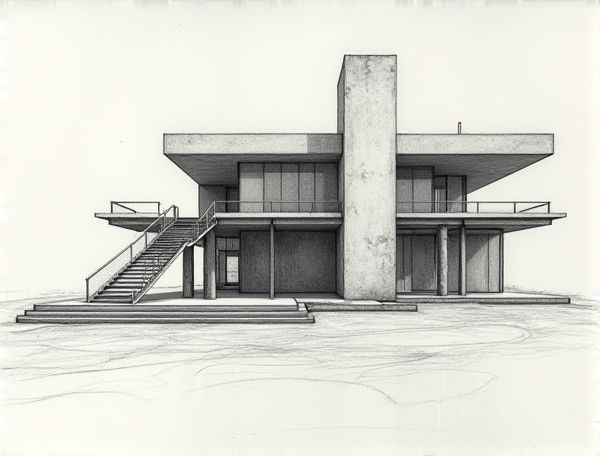
Photo illustration: Constructivist home design with monolithic steel staircases
Constructivist home design emphasizes bold geometric shapes and functional forms, with monolithic steel staircases serving as striking, durable focal points that enhance both structure and aesthetic. Discover how integrating these powerful elements can transform your living space--read more in the article.
Introduction to Constructivist Home Design
Constructivist home design emphasizes geometric forms, functional spaces, and the integration of modern materials like steel and glass to create efficient, minimalist living environments. This architectural style focuses on practicality and structural clarity, promoting open floor plans and the elimination of unnecessary ornamentation. By prioritizing innovation and utility, constructivist homes reflect the dynamic spirit of early 20th-century avant-garde movements.
The Essence of Monolithic Steel Staircases
Monolithic steel staircases offer unmatched structural integrity and sleek, minimalist aesthetics, making them a focal point in contemporary home design with their seamless, load-bearing construction. Their durability and customizability enhance spatial efficiency while providing a bold architectural statement that integrates both form and function.
Historical Roots of Constructivism in Architecture
Constructivism in architecture emerged in the early 20th century Soviet Union, reflecting the ideologies of the Russian Revolution and emphasizing functionality, geometric forms, and industrial materials like steel and glass. Key figures such as Vladimir Tatlin and Aleksandr Rodchenko pioneered designs that integrated art and technology, aiming to create socially purposeful structures. This movement influenced modern home design by promoting open floor plans, minimal ornamentation, and the use of innovative construction techniques rooted in constructivist principles.
Benefits of Steel Staircases in Modern Homes
Steel staircases offer unparalleled durability and sleek aesthetics, seamlessly enhancing the modern home's structural integrity and contemporary design. By choosing steel, you ensure a low-maintenance, fire-resistant solution that maximizes space efficiency and complements various interior styles.
Designing with Monolithic Forms: Key Principles
Monolithic forms in home designing emphasize simplicity, solid structures, and seamless surfaces that create a sense of unity and strength throughout your space. Key principles include using clean lines, minimal ornamentation, and emphasizing geometric shapes to achieve a cohesive and modern aesthetic. Your design should balance scale and proportion to maintain visual harmony while maximizing functionality and durability.
Integrating Industrial Elements into Residential Spaces
Exposed brick walls, metal beams, and concrete floors create a raw, urban aesthetic that defines industrial home design. Incorporating reclaimed wood furniture and vintage factory lighting enhances texture and character while maintaining warmth. Open floor plans combined with minimalist decor optimize spaciousness and highlight structural features, blending functionality with edgy style.
Structural Integrity and Safety Considerations
Structural integrity in home design ensures the building can withstand environmental stresses and load demands, preventing collapse or damage. Incorporating safety considerations like fire-resistant materials, proper load distribution, and adherence to local building codes enhances occupant protection and long-term durability.
Aesthetic Impact on Interior Environments
Aesthetic impact in interior environments significantly influences mood, perception, and spatial harmony by integrating elements such as color schemes, textures, lighting, and furniture arrangement. Well-designed aesthetics improve emotional well-being, enhance functionality, and create visually appealing spaces that reflect personal style and cultural context.
Maintenance and Longevity of Steel Structures
Steel structures offer exceptional durability and require minimal maintenance, resisting pests, rot, and fire while maintaining structural integrity over decades. You can enhance your home's longevity by choosing galvanized or weather-resistant steel treatments that prevent corrosion and reduce long-term upkeep costs.
Future Trends in Constructivist Home Design
Future trends in constructivist home design emphasize the integration of sustainable materials and smart technology to enhance functionality and environmental impact. Modular structures and adaptive spaces driven by AI-based customization redefine personalized living environments and optimize spatial efficiency.
 homedesy.com
homedesy.com